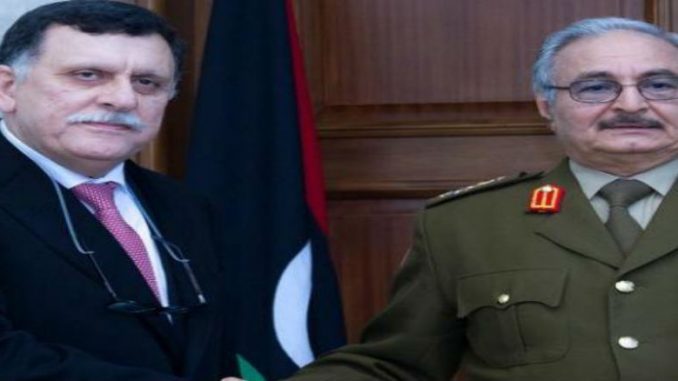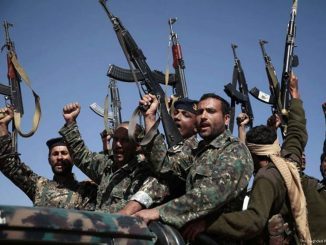
The 10th session of Libya’s neighboring countries meeting held in Cairo urged dialogue as the only solution to put an end to the Libyan crisis.
The meeting was attended by the foreign ministers of Libya, Tunisia, Egypt, Sudan, Chad, and Niger, and the head of the UN Special Mission to Libya, Martin Kobler, Arab League’s Secretary General Ahmed Aboul Gheit, African Union Special Envoy in Libya, Jakaya Kikwete and representatives of international organizations.
The final official communique of the meeting reiterated rejection of any military action or foreign military interference in Libya, highlighted the importance of cooperation among Libya’s neighbors in border security and agreed to hold their 11th meeting in Algeria, but the date has not yet been decided.
In his speech at the 10th ministerial meeting of Libya’s neighboring countries, Egypt’s Foreign Minister Sameh Shoukry stressed that Egypt is committed to Libya’s sovereignty and will always support its legitimate institutions and reject any interference in the country’s affairs.
Shoukry also explained that a political solution is the only way to resolve the Libyan crisis and that Libya’s neighbors are exerting efforts to bring Libyan leaders together for a direct dialogue to build mutual confidence and understanding.
He added, “The Skhirat Agreement is the perfect solution to the Libyan crisis. The agreement guarantees effective participation of all Libyan parties with the aim to put an end to the current crisis.”
Egypt’s Al-Sisi Seeks to Amend the Skhirat Agreement
Al-Sisi’s military and political officials have been working with different Libyan factions to strengthen Haftar’s role in Libya especially by focusing on amending the Political Agreement (PA) article that outlined the authorities of the Libyan army chief commander and that also excluded Haftar from leading the army.
Haftar is a military figure, backed by Tobruk government based in eastern Libya that refuses to recognize the U.N.-backed government, enjoys the support of several Arab nations, including Egypt, the United Arab Emirates, and Jordan, as well as western countries as France.
In this context, excessive meetings have been held, under Egypt’s auspices, with several Libyan officials and members in Tobruk’s House of Representatives to resolve the Libyan crisis and amend the Skhirat agreement in a way that enclose Libya’s strongman in the political process.
On December 13, 2016, Cairo hosted a conference attended by Libyan officials and representatives from the country’s numerous factions, where they issued a declaration of principles and five proposed amendments to an agreement, brokered by the UN in 2015.
The Libyan Political Agreement, signed in Skhirat, Morocco December 2015 known as the Skhirat Agreement, intensified the internal strife rather than resolving it.
The conference concluded an agreement on amending the 8th article of the 2015 agreement that outline the authorities of the Libyan army chief commander.
The article constituted a major obstacle during signing Skhirat agreement as it included the exclusion of General Khalifa Haftar from leading the army.
The conference meetings were brokered under the auspices of the Egypt’s General Intelligence Directorate and in a hotel related to the security entity.
The two-day conference was attended by Egypt’s foreign minister Sameh Shoukry and Army Chief of Staff Mahmoud Hegazi along with a range of Libyan representatives without the invitation or the attendance of any representative from the Islamic currents.
In this context, some parties in western Libya accused the conference of including only one stream in the Libyan crisis and that it didn’t include the other influential parties in the western area, especially the security council of Misrata city and the Islamic currents.
The conference concluded what the participants consider as “a road map to achieve unity in Libya during the coming period, “and one of the major recommendations presented by the participants, “to reconsider the responsibilities of the army chief commander that is currently held by Aqila Saleh, the head of Tobruk’s House of Representatives (HoR), who has promoted General Khalifa Haftar to Field Marshal last September.
In the same context, a Libyan high ranking military delegation reportedly arrived in Cairo on December 19 in a visit that lasted for several days.
The delegation, which arrived in a private jet from Libya, was headed by Libyan Defense Ministry’s Counselor Mohamed Abu al-Kassem Saleh, and mostly discussed the amendment of the Skhirat agreement, as was seen by many observers.
The Libyan delegation met with a number of top officials and figures in Egypt to discuss enhancing the cooperation ties, and the developments on the Libyan arena.
In addition, a bilateral meeting was headed by Hegazi and some members from Tobruk’s parliament and Libyan intellectuals to resolve the Libyan crisis on December 21.
Moreover, Aqila Saleh, the president of the House of Representatives (HoR), has again been holding talks with top Egyptian officials on the Libyan crisis.
Saleh met with Egypt’s Chief-of-Staff, Lieutenant General Mahmoud Hegazi, as well as Foreign Minister Sameh Shoukry and other officials.
According to the official Facebook page of Egypt’s Foreign Ministry, Saleh discussed with high rank diplomatic and military officials the current situation and the recent developments on the Libyan arena.
In addition to the exerted efforts to reach a compromise based on the Political Agreement (PA) as general framework to reach a political resolution in Libya in the light of the outcomes that resulted from Cairo Conference.
Moreover, a third meeting was held this January between Egypt’s Chief-of-Staff, Lieutenant General Mahmoud Hegazi and members from Tobruk’s House of Representatives (east Libya) to resolve the Libyan crisis.
Egypt’s Minister of Defense said in a statement that Hegazi, the head of the committee in charge of the Libyan issue, and members of the committee, “summoned to Cairo an unidentified number of members from the Libyan House of Representatives (HoR), known as Tobruk’s Parliament, to continue the ongoing efforts to resolve the conflicting points that led to a political deadlock in Libya.”
The statement said that, “The meeting was to find a mechanism that would contribute in the political resolution in the light of the Political Agreement (Skhirat Agreement), and would allow all the parties related to the crisis to participate, particularly the members of the HoR (Tobruk’s parliament) and the members of Libya’s State Council (one of the outcomes of the Skhirat Agreement).
Furthermore, Hegazi also met with the Chairman of the Libyan presidential council in the Government of National Accord (known as the UN baked government), Fayez Al-Serraj last week, to discuss possible solutions to the situation in Libya, according to a statement by the Egyptian Armed Forces’ media office.
Al-Serraj also met with Abdel Fattah al-Sisi to discuss the recent developments on the Libyan arena.
According to Al-Serraj, who emphasized the need for a national dialogue and warned against internal conflicts, said the situation in Libya is complicated by political reluctance.
Cairo Is Preparing a Meeting Between Haftar and Al-Serraj
According to high-profile Egyptian sources, Cairo is preparing to host a meeting between General Khalifa, and the Chairman of the Libyan presidential council in the UN-backed Government of National Accord (GNA) Fayez Al-Serraj, as reported by Libya express.
The sources added, “the meeting will try to build bridges between the two parties and will aim at finding a solution for the Libyan political crisis.”
It is worth to mention that Gen. Haftar met with Egyptian Chief of Staff Lieutenant-General Mahmoud Hegazi prior to Libya’s neighboring countries meetings.
Haftar and Hegazi discussed the results of meetings in Cairo between Egyptian officials and different Libyan powers and groups.
Since the Libyan Revolution that overthrew the long-time dictator 2011 Muammar Gaddafi, violence has spread in Libya among the different Libyan factions.
Two rival governments operate in Libya, with self-proclaimed authorities controlling the capital of Tripoli and adjacent western areas and an internationally recognized government, based in the eastern Libyan city of Tobruk.
Moreover, a third government was formed known as the Government of National Accord(GNA) supported by many western countries. The government has so far failed to restore the country’s unity.
None of the governments has a complete dominance over Libya until now.



